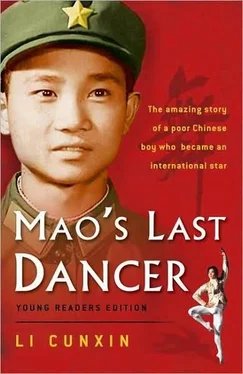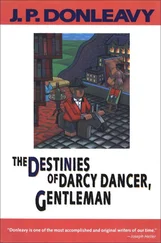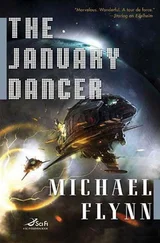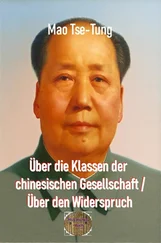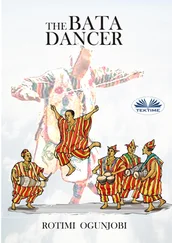My niang was already waiting anxiously by the gate. She was relieved to see us both. "Thank you for sending Jing Hao to meet me," my dia said.
My niang was surprised. She looked at him, then at me, and suddenly understood what I had done. She lifted me off the bike and hugged me so tight that I felt my bones crack. She burst into tears and laughter. "You little smart devil! You little smart devil!" she kept saying.
My dia was puzzled. "What's all this about?"
"I didn't send him to meet you!" my niang said, laughing her contagious laugh. "Who cares about you? It's all his doing!"
"I thought it was strange that you didn't send one of the older boys," my dia said with a rare smile. "I'm starving, what's for dinner?"
"North-west wind!" my niang joked.
My parents were speaking to each other again, the first time in over a week. The next morning Niang was looking for her hairpins on my dia's side of the bed again.
By 1969, when I was about eight years old, the poverty around Laoshan and our commune had worsened. I remember going with several of my friends to the beach one day, an hour's journey away by foot, to find clams and oysters or, if we were lucky, a dead fish that was washed up on the shore. We each carried our own bamboo basket in our arms and a small spade over our shoulders. My parents always warned us never to go into the water because of the rips.
Many people were already there, also searching, by the time we arrived. After about half an hour, we'd found nothing except empty seashells. The beach was so clean and bare it was as if even the sea creatures had abandoned us.
Halfway home I suggested to my friends that we should make a slight detour and sneak into the nearby airport to try and find some half-burnt coal. During the Second World War the Japanese had built this airport as one of their main cargo facilities. Now there were only a few People's Liberation Army guards and some old cargo planes left. The Japanese used coal and half- burnt coal as part of the filler under the runway, and the outer part of the runway had already been dug away by desperate people. Since then the guards had tightened security.
I had only been there once before, with one of my older brothers. There was a line of big trees along the edge of the airport and a small ditch for water drainage. The ditch was dry at that time of the year and we crept along it for about fifteen minutes, bending our bodies down into the ditch so the guards couldn't see us.
There was still evidence of half-burnt coal there, about half a yard below the surface, and very hard to loosen. But digging half-burnt coal was like digging gold for us. We had no sense of time and we eventually had our baskets full. Carrying heavy baskets with a bent body, though, proved too difficult for us eight-year-olds. About halfway out, one of the boys slowly straightened up and was spotted by the military guards. They immediately fired bullets into the air and started to chase us. We were scared witless. We dumped our baskets and spades, and ran for our lives.
I rushed breathlessly home. It was half past one in the afternoon. "There is some food in the wok for you," my fifth brother Cunfar said. Niang had left some dried yams and pickled turnips for me.
"Where is Niang?" I asked him as I ate my lunch.
"She went back to work in the fields," he replied. Cunfar only had morning classes at school that day. There weren't enough classrooms for everyone to go for a full day.
"Where have you been?" he asked me.
I told him what had happened at the airport. He frowned. "You dropped your basket and spade there?"
"Yes, I had no choice! The soldiers would have killed us if they'd caught us!"
"No, they wouldn't," he replied.
"Yes, they would! They even fired bullets at us!"
"You have to go back and get your basket and spade. We cannot buy new ones-our parents have no money," he said.
"I'll never go anywhere near that airport again!" But he did eventually talk me into going back. At the edge of the ditch I refused to go any further and pointed to where we'd dropped our baskets and spades. He went to look, but the guards had confiscated them. Only some half-burnt coals were left scattered around the ditch.
Our winters in those days were bitterly cold in Qingdao, but as well as having to cope with the lack of coal, we also had to deal with lice. They lived with us in our cotton quilts, coats and pants. Unlike our summer clothes, which our niang washed regularly, our quilted winter coats and pants couldn't be washed because they were painstakingly made with loose cottonwool pieces that would have shrivelled into balls in the water. The only proper way to wash our winter clothes was to take them apart and restart the whole messy, tiring, time-consuming process of making them all over again. Our niang would spread the cottonwool on our kang and the fibres would fly everywhere, like white dust. She'd have white fibres all over her black hair and clothes. She'd look like a white cotton ball herself. But once they were made, our winter clothes would last the entire season.
The only real way to combat lice was to keep clean. Every weekend our niang would heat up huge woks of water for us and tip the water into an old wooden washing-basin. Each of us had a piece of thin washing-cloth, and we'd soap our bodies and help to wash each other's backs. If one family member had lice, the rest of the family would too: they bred and multiplied so quickly. It wasn't just our family-lice were everywhere in China. Everyone scratched constantly. In the evenings after we took off our clothes and got under the quilts, our niang always flipped our clothes inside out, trying to kill the lice with her thumbnails. By the end of the evening her thumbnails would be covered in blood. She was such an expert at killing those little bloodsuckers: she had the most incredible eyesight, despite the dim light. We had a single twenty-watt bulb hanging down from the ceiling in each room (electricity had come to our village the year before I was born). Generally, the commune would cut off power at eight every night. Then Niang would light a small kerosene lamp and patiendy continue her work. But she could never get rid of the lice completely because they lived inside the seams of the fabric. They only came out to suck our blood during the day when we wore our clothes.
I have so many vivid childhood memories like these, but I do not ever remember going to a doctor or hospital as a child: not that I didn't get sick, but we could never afford it. The only time I got close to a medical person was waiting in line for a barefoot nurse to give us smallpox shots. We had to wait in long lines in our commune square with our sleeves rolled up. The nurse used the same needle to inject everybody, and small pieces of alcohol- soaked cottonwool to clean the needle heads and skin. Mothers held screaming babies in their arms, but children aged five or over were expected to be brave enough to go up the line by themselves. Crying wasn't an option, no matter how much it scared us or how much it hurt. When I cut myself I was told by my parents to swipe my fingers on the windowsill to gather some dust to put on the cut and stop the bleeding. This was our Band-aid and antiseptic all in one.
Our niang's remedy for severe coughs, however, involved a snakeskin collected in the fields during autumn when snakes shed their skin. She would wrap the snakeskin around a piece of green onion and make me eat it in front of her. All of it. The snakeskin was like tasteless plastic and it looked disgusting. It always made me want to vomit, but it was the most effective treatment for sore throats and coughs we had.
One day my face and neck swelled up for several days because of infected glands. Niang took me to a neighbour and he brought out a calligraphy set. He ground the black ink stick in an ink plate and mixed in some water. He dipped in his paintbrush. I thought he was going to write a secret recipe to cure my infection, but instead he asked me to close my eyes and he started to draw on my face. As he drew, he uttered some strange words to the god of healing. I didn't understand the words, but I enjoyed the cool sensation of the ink on my skin. I felt as though someone other than my niang was pampering me for the first time in my life. Eventually my entire face and neck were black. I looked scary, comical-like an evil Beijing Opera character.
Читать дальше
